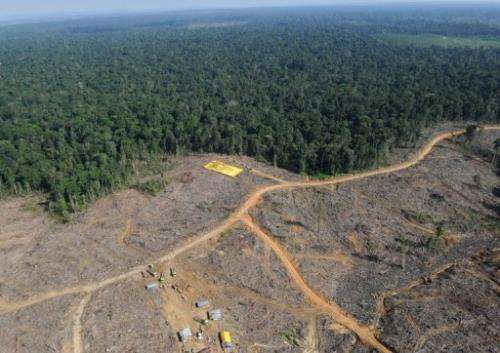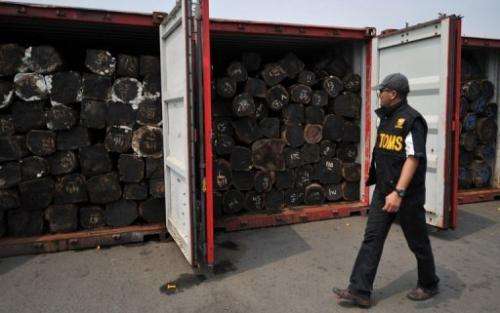Logging works cut into the virgin forest in Jambi province, Sumatra island, Indonesia in 2010. Indonesia has extended a logging ban to protect rainforests despite fierce industry pressure, the government said Wednesday, but green groups slammed it as inadequate to safeguard threatened habitats.
Indonesia has extended a logging ban to protect rainforests despite fierce industry pressure, the government said Wednesday, but green groups slammed it as inadequate to safeguard threatened habitats.
Vast tracts of the sprawling Indonesian archipelago are covered in trees, including some of the world's most biodiverse tropical rainforest that is home to endangered animals such as orangutans, tigers and elephants.
But huge swathes have been chopped down by palm oil, mining and timber companies in Southeast Asia's top economy, which has become the world's third-biggest carbon emitter as a result.
Under a $1-billion conservation deal with Norway, President Susilo Bambang Yudhoyono two years ago signed the moratorium, which bans new logging permits for primary, or virgin, forest, defined as forest not logged in recent history.
On Wednesday, the government confirmed Yudhoyono had signed a two-year extension, and the moratorium would remain in its original form.
"The extension on the moratorium of new permits will be in place for two years from when the presidential instruction is issued," said a statement from the cabinet secretariat, which deals with presidential decrees.
Yudhoyono signed the extension on Monday, it said.
The ban applies to new permits for primary forest and peatland with the exception of projects already approved by the forestry minister and others considered vital, such as for power production, it said.
An endangered Sumatran orangutan with a baby swings through the trees in the vast Leuser National Park, in Indonesia's Sumatra island, April 10, 2013. Alarm is growing at a plan that would open up new swathes of forest on Sumatra island to mining, palm oil and paper companies, which could put orangutans and other critically endangered species at even greater risk.
Indonesia, the world's top producer of palm oil that is used in many everyday items from soap to biscuits, has faced fierce industry pressure over the ban.
"The moratorium has already had negative effects on the economy, not just in the palm oil industry but the timber industry as well," said Fadhil Hasan, from the Indonesian Palm Oil Association.
The government says the moratorium has drastically reduced logging in a country with the third-most tropical forest in the world, according to the United Nations.
Senior forestry ministry official Hadi Daryanto said that between 2000 and 2010, Indonesia lost around 1.125 million hectares (2.8 million acres) of forest each year.
But he said that by around six months into the moratorium, at the end of 2011, this figure had been reduced to the equivalent of 450,000 hectares annually.
An Indonesian customs officer inspects illegal logs placed inside containers at Jakarta port on September 20, 2011. Huge swathes have been chopped down by palm oil, mining and timber companies in Southeast Asia's top economy, which has become the world's third-biggest carbon emitter as a result.
However, green groups claim that local authorities are using a murky web of local laws to open up new areas for exploitation in defiance of the ban, and that much logging has continued illegally.
"Companies and local governments have found all sorts of ways to get around the ban," said Friends of the Earth campaigner Zenzi Suhadi.
Greenpeace also criticised the government for not taking the opportunity to strengthen the ban.
"That is what's really needed if we want to save Indonesia's remaining tigers and orangutans, which are under threat from relentless palm oil, and pulp and paper expansion," said the group's forests campaigner Yuyun Indradi.
© 2013 AFP


























